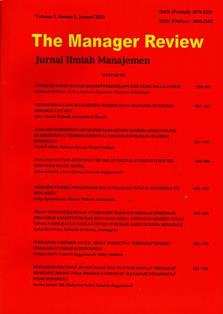Main Article Content
Abstract
This study analyzes the influence of consumer ethnocentrism, perceived quality, and brand awareness on consumers’ purchase intention toward Hoka-Hoka Bento in Bengkulu City, with brand image as a mediating variable. Using a quantitative explanatory method, data were collected from 150 respondents through purposive sampling and analyzed with PLS-SEM. The results show that perceived quality and brand awareness significantly influence brand image, while consumer ethnocentrism and perceived quality directly affect purchase intention. Brand image mediates the effect of perceived quality on purchase intention but not consumer ethnocentrism or brand awareness. The findings suggest that improving product quality and strengthening brand image are key strategies to enhance consumer purchase intention. The novelty of this study lies in examining consumer behavior toward a Japanese-inspired fast-food brand in a second-tier city, while its originality lies in testing the mediating role of brand image within an emerging market context where cultural perceptions strongly shape purchasing decisions.
Keywords
Article Details
Copyright (c) 2025 FAJRIANSAH RAMADHAN ramadhan, veny puspita, M.Noor Army, Eko Sumartono

This work is licensed under a Creative Commons Attribution-ShareAlike 4.0 International License.
References
- Aaker, D. A. (1996). Building strong brands. Free Press.
- Hair, J. F., Black, W. C., Babin, B. J., & Anderson, R. E. (2010). Multivariate data analysis (7th ed.). Pearson Education.
- Handayani, N., & Prasetyo, A. R. (2021). Pengaruh etnosentrisme konsumen terhadap keputusan pembelian produk lokal di era globalisasi. Jurnal Manajemen dan Bisnis Indonesia, 7(2), 112–120. https://doi.org/10.12345/jmbi.v7i2.345
- Keller, K. L. (2003). Strategic brand management: Building, measuring, and managing brand equity (2nd ed.). Pearson Education International.
- Kotler, P., & Keller, K. L. (2016). Marketing management (15th ed.). Pearson Education.
- Nadia, R. M. (2022). Brand image sebagai mediasi pengaruh brand awareness terhadap minat beli pada produk makanan cepat saji. Jurnal Ilmu Ekonomi dan Bisnis, 10(1), 45–53. https://doi.org/10.21009/jieb.101.05
- Pratama, A. H., & Wahyuni, I. (2020). Pengaruh brand awareness dan perceived quality terhadap minat beli dengan brand image sebagai variabel intervening. Jurnal Administrasi dan Bisnis, 19(1), 20–31. https://doi.org/10.30996/jab.v19i1.4567
- Shimp, T. A., & Sharma, S. (1987). Consumer ethnocentrism: Construction and validation of the CETSCALE. Journal of Marketing Research, 24(3), 280–289. https://doi.org/10.2307/3151638
- Sugiyono. (2017). Metode penelitian kuantitatif, kualitatif, dan R&D. Alfabeta.
References
Aaker, D. A. (1996). Building strong brands. Free Press.
Hair, J. F., Black, W. C., Babin, B. J., & Anderson, R. E. (2010). Multivariate data analysis (7th ed.). Pearson Education.
Handayani, N., & Prasetyo, A. R. (2021). Pengaruh etnosentrisme konsumen terhadap keputusan pembelian produk lokal di era globalisasi. Jurnal Manajemen dan Bisnis Indonesia, 7(2), 112–120. https://doi.org/10.12345/jmbi.v7i2.345
Keller, K. L. (2003). Strategic brand management: Building, measuring, and managing brand equity (2nd ed.). Pearson Education International.
Kotler, P., & Keller, K. L. (2016). Marketing management (15th ed.). Pearson Education.
Nadia, R. M. (2022). Brand image sebagai mediasi pengaruh brand awareness terhadap minat beli pada produk makanan cepat saji. Jurnal Ilmu Ekonomi dan Bisnis, 10(1), 45–53. https://doi.org/10.21009/jieb.101.05
Pratama, A. H., & Wahyuni, I. (2020). Pengaruh brand awareness dan perceived quality terhadap minat beli dengan brand image sebagai variabel intervening. Jurnal Administrasi dan Bisnis, 19(1), 20–31. https://doi.org/10.30996/jab.v19i1.4567
Shimp, T. A., & Sharma, S. (1987). Consumer ethnocentrism: Construction and validation of the CETSCALE. Journal of Marketing Research, 24(3), 280–289. https://doi.org/10.2307/3151638
Sugiyono. (2017). Metode penelitian kuantitatif, kualitatif, dan R&D. Alfabeta.
